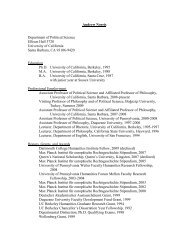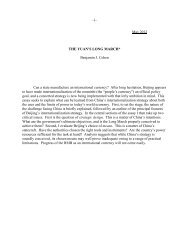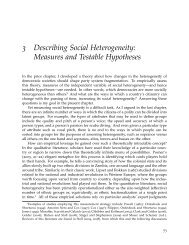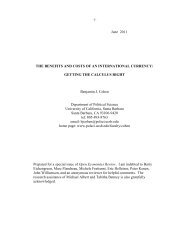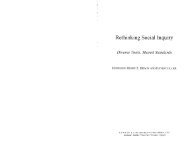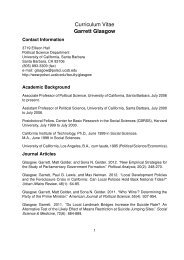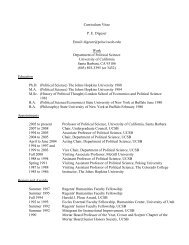Are Niche Parties Fundamentally Different from Mainstream Parties ...
Are Niche Parties Fundamentally Different from Mainstream Parties ...
Are Niche Parties Fundamentally Different from Mainstream Parties ...
You also want an ePaper? Increase the reach of your titles
YUMPU automatically turns print PDFs into web optimized ePapers that Google loves.
ARE NICHE PARTIES DIFFERENT? 525<br />
Shift Hypothesis, that in comparison to mainstream parties,<br />
niche parties are penalized for shifting their positions<br />
regardless of policy direction.<br />
Conclusion and Discussion<br />
We have reported empirical analyses of data <strong>from</strong> eight<br />
Western European democracies, on the linkages between<br />
parties’ Left-Right positions, public opinion, and election<br />
results. Basing our computations on the Comparative<br />
Manifesto Project codings of party ideologies and<br />
the Eurobarometer surveys of citizens’ Left-Right selfplacements,<br />
we find results that consistently support the<br />
Policy Stability Hypothesis, that niche parties’ policy programs<br />
are less responsive to shifts in public opinion than<br />
are mainstream parties’ programs. We also find empirical<br />
support for the Costly Policy Moderation Hypothesis,<br />
that niche parties are penalized for moderating their<br />
policy programs to a greater extent than are mainstream<br />
parties.<br />
From an empirical standpoint, our findings in support<br />
of the Policy Stability Hypothesis are relevant to the<br />
literature on dynamic representation (Erikson, MacKuen,<br />
and Stimson 2002; Stimson, MacKuen, and Erikson 1995),<br />
which emphasizes the linkages between parties’ policy positions<br />
and public opinion. In the U.S. context, which features<br />
two large, mainstream parties, this literature concludes<br />
that American politicians frequently adjust their<br />
policies in response to shifts in public opinion. 18 Our<br />
findings suggest that this pattern of dynamic representation<br />
generalizes to Western Europe: Specifically, we<br />
find strong evidence that mainstream parties in Western<br />
Europe systematically respond to shifts in the policy<br />
preferences of their national electorates, just as politicians<br />
do in the United States. However, we also find<br />
that niche parties in Western Europe do not display<br />
similar patterns of policy responsiveness. This suggests<br />
that when we export the dynamic representation perspective<br />
to Western Europe, we must account for the<br />
types of political parties that compete in these party<br />
systems.<br />
Our findings in support of the Costly Policy Moderation<br />
Hypothesis—namely, our conclusion that niche<br />
parties, but not mainstream parties, suffer electoral penal-<br />
18 We note that the degree of American politicians’ policy responsiveness<br />
has been found to vary across electoral domains (i.e., these<br />
effects vary depending on whether one focuses on the House of Representatives,<br />
the Senate, or the Presidency). See Stimson, MacKuen,<br />
and Erikson (1995; also Erikson, MacKuen, and Stimson 2002) for<br />
a discussion of these issues.<br />
ties when they moderate their policy positions—suggests<br />
a simple explanation for our finding that policy responsiveness<br />
differs dramatically between these two types of<br />
parties: namely, that it is often not electorally feasible<br />
for niche parties to adjust their policies in response to<br />
changes in public opinion, while such policy adjustments<br />
are electorally feasible for mainstream parties. We emphasize<br />
that, as discussed earlier, there are factors in addition<br />
to electoral considerations that plausibly motivate niche<br />
parties’ elites to stand pat in the face of public opinion<br />
shifts, such as the importance these elites place on policyrelated<br />
objectives. However, our findings in support of<br />
the Costly Policy Moderation Hypothesis suggest that for<br />
niche parties, both vote-seeking and policy-seeking objectives<br />
motivate a stand-pat strategy: for it makes little<br />
sense for a niche party to moderate its policy program<br />
in response to shifts in public opinion, if such an<br />
adjustment depresses the party’s electoral support and<br />
moves the party away <strong>from</strong> its members’ preferred policy<br />
positions.<br />
From a theoretical standpoint, our findings suggest<br />
that the assumption of “costless spatial mobility” that spatial<br />
modelers typically employ—i.e., that political parties<br />
are not penalized for shifting their positions in the policy<br />
space—may be a reasonable assumption with respect to<br />
mainstream parties. While we support this interpretation<br />
up to a point, we caution readers against extrapolating<br />
our findings to party policy shifts that are larger than<br />
the shifts we actually observed in our study. In particular,<br />
given Budge’s (1994) empirical finding that political<br />
parties in postwar Europe have tended to adjust their policies<br />
incrementally—a pattern that we also observe in our<br />
data 19 —we are highly skeptical that mainstream parties<br />
could completely repudiate their prior policy commitments<br />
without electoral cost. In this regard, we suspect<br />
that the British Labour Party’s dramatic shift to the center<br />
under Tony Blair—one of the sharpest policy shifts registered<br />
in our data 20 —defines the upper limit on the extent<br />
to which mainstream parties can costlessly shift their programs.<br />
This caveat notwithstanding, we find no evidence<br />
that mainstream parties were penalized for shifting their<br />
19 For the parties in our data, the median magnitude of the policy<br />
shifts between elections was 0.43 policy units along the 1–10 Left-<br />
Right scale.<br />
20 Based upon the CMP codings, the British Labour Party shifted<br />
approximately two policy units to the right between 1992 and 1997,<br />
along the 1–10 Left-Right scale that we used for our analyses. This<br />
was the third largest policy shift observed in our data, behind only<br />
New Democracy’s shift to the left in Greece between 1993 and 1996,<br />
and the Venstre Liberals’ shift to the right in Denmark between 1990<br />
and 1994.



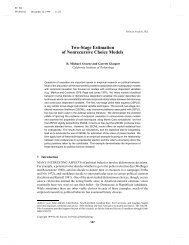
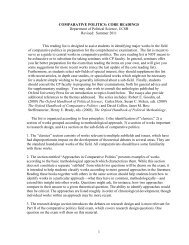
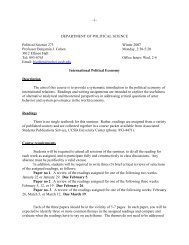
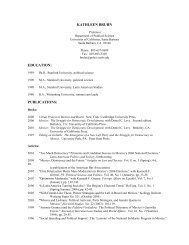
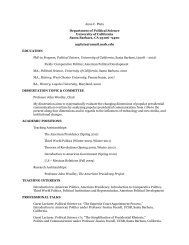
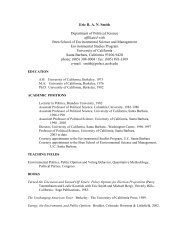
![Curriculum Vitae [abbreviated] John T. Woolley Professor of Political ...](https://img.yumpu.com/25423597/1/190x245/curriculum-vitae-abbreviated-john-t-woolley-professor-of-political-.jpg?quality=85)
